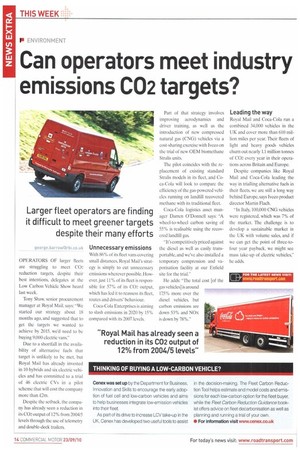Can operators meet industry emissions CO2 targets?
Page 14

If you've noticed an error in this article please click here to report it so we can fix it.
Larger fleet operators are finding it difficult to meet greener targets despite their many efforts
george.barrowfarbi.co.uk OPERATORS OF larger fleets are struggling to meet CO2 reduction targets, despite their best intentions, delegates at the Low Carbon Vehicle Show heard last week.
Tony Shaw, senior procurement manager at Royal Mail. says: "We started our strategy about 18 months ago, and suggested that to get the targets we wanted to achieve by 2015, we'd need to be buying 9,000 electric vans" Due to a shortfall in the availability of alternative fuels that target is unlikely to be met, but Royal Mail has already invested in 10 hybrids and six electric vehicles and has committed to a trial of 46 electric CVs in a pilot scheme that will cost the company more than £2m.
Despite the setback, the company has already seen a reduction in its CO2 output of 12% from 2004/5 levels through the use of telemetry and double-deck trailers.
Unnecessary emissions
With 86% of its fleet vans covering small distances, Royal Mail's strategy is simply to cut unnecessary emissions wherever possible. However. just 11% of its fleet is responsible for 57% of its CO2 output, which has led it to reassess its fleet, routes and drivers' behaviour.
Coca-Cola Enterprises is aiming to slash emissions in 2020 by 15% compared with its 2007 levels Part of that strategy involves improving aerodynamics and driver training, as well as the introduction of new compressed natural gas (CNG) vehicles via a cost-sharing exercise with New on the trial of new OEM biomethane Stralis units.
The pilot coincides with the replacement of existing standard Stralis models in its fleet, and Coca-Cola will look to compare the efficiency of the gas-powered vehicles running on landfill recovered methane with its traditional fleet.
Coca-Cola logistics asset manager Darren O'Donnell says: "A wheel-to-wheel carbon saving of 55% is realisable using the recovered landfill gas.
"It's competitively priced against the diesel as well as easily transportable, and we've also installed a temporary compression and vaporisation facility at our Enfield site for the trial."
He adds: "The total cost [of the gas vehicles] is around 17.5% more over the diesel vehicles, but carbon emissions are down 53% and NOx is down by 78%."
Leading the way
Royal Mail and Coca-Cola run a combined 34,000 vehicles in the UK and cover more than 610 million miles per year. Their fleets of light and heavy goods vehicles churn out nearly 1.1 million tonnes of CO2 every year in their operations across Britain and Europe.
Despite companies like Royal Mail and Coca-Cola leading the way in trialling alternative fuels in their fleets, we are still a long way behind Europe, says Iveco product director Martin Flach.
-In Italy, 100,000 CNG vehicles were registered, which was 7% of the market. The challenge is to develop a sustainable market in the UK with volume sales, and if we can get the point of three-tofour year payback, we might see mass take-up of electric vehicles," he adds.
































































































































